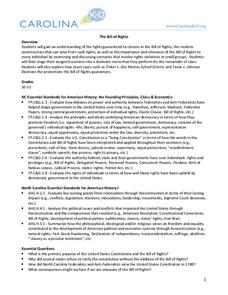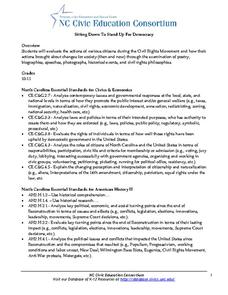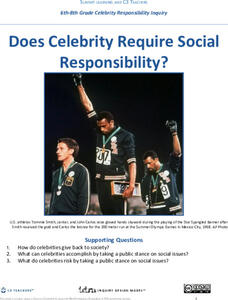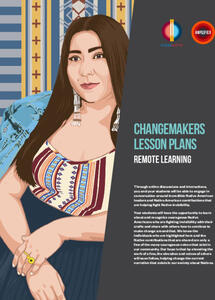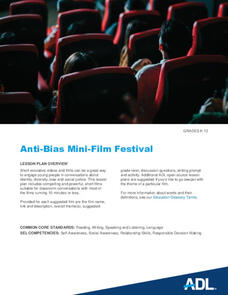Odell Education
Making Evidence-Based Claims: Grade 8
American women have been working toward equal rights since the ink dried on the Declaration of Independence. Focused on the words and actions of Sojourner Truth, Shirley Chisholm, and Venus Williams, a language arts lesson takes eighth...
Carolina K-12
On the Road to Revolution: Creating a Living Timeline
Divided into nine topic groups, from the Proclamation of 1763 to the Battles of Lexington and Concord, your young historians research significant events on the road to the American Revolution, then create a two- to three-minute sketch...
Carolina K-12
Trench Warfare in World War I
Class members engage in an experiential activity and research topics related to the exercise to gain a deeper understanding of the conditions in the trenches during World War I. A potent and thought-provoking activity.
Carolina K-12
The Major Conferences of World War II
Young historians create a 1940's news radio broadcast on the five major World War II conferences, including the Atlantic, Casablanca, Tehran, Yalta, and Potsdam.
Center for Literacy and Disability Studies
The Bill of Rights
Explore the Bill of Rights in-depth with this resource packet that includes the complete text of the document, scenarios and discussion questions for each amendment, role-playing activities, exercises, questions for a Socratic seminar, a...
University of North Carolina
Sitting Down To Stand Up For Democracy
Boycotts and bus rides, sit-ins and speeches. The focus of this amazing resource is on those people who were willing to put themselves at risk to take a stand for their belief in equal rights for all. A must-have for your curriculum...
University of North Carolina
The Narrative of the Life of Frederick Douglass, an American Slave
After reading excerpts from Frederick Douglass' autobiography, pupils will draw on what they've learned about the cruelty of slavery to write and present an anti-slavery speech or editorial.
University of Minnesota
Chemotaxis Using C. elegans
Have you ever wondered what roundworms are like? Or what they don't like? Explore the sensory preferences of C. elegans through this controlled chemotaxis experiment. Biology class members brainstorm what substances might attract—or...
C3 Teachers
Women’s Rights: What Does It Mean to Be Equal?
A guided-inquiry lesson asks seventh graders to research the compelling question, "What does it mean to be equal?" Guided by three supporting questions, researchers complete three formative performance tasks and gather evidence from...
University of Minnesota
Memory Items
Ready to have an "unforgettable" time in science class? Try a fun and insightful activity, suitable for a wide age group of learners. Explore how human memory works when pupils try to remember objects they've seen before comparing the...
C3 Teachers
Uncle Tom’s Cabin: Can Words Lead to War?
"Words, words, words." Despite Hamlet's opinion, words can be significant. In this inquiry lesson, middle schoolers learn how the words in Harriet Beecher Stowe's Uncle Tom's Cabin, in the view of many, lead to the American Civil War. To...
C3 Teachers
Celebrity Social Responsibility: Does Celebrity Require Social Responsibility?
Is much required of those to whom much is given? That's the central question asked of middle schoolers in this lesson. Scholars consider the actions of Tommie Smith and John Carlos, Colin Kaepernick, Lady Gaga, and others who have taken...
K20 LEARN
OPTIC - A Reading Strategy Recipe: Visual Literacy
A visual literary lesson provides learners with OPTIC (Observations, Predictions, Themes, Inferences, Conclusions), a reading strategy to help them understand and interpret visual and written texts. Scholars practice the strategy with a...
Curated OER
Changemakers Lesson Plans
Teens and tweens are invited to become changemakers in a five-lesson unit, asking them to investigate and share what they have learned about exemplary, contemporary Native Americans. They gather facts about their research subject, record...
Anti-Defamation League
The Revealers: Discussion Guide for Grades 6-8
Suspense! Rebellion! Cyberbullying! No wonder Doug Wilhelm's novel The Revealers appeals to middle schoolers. Instructors new to using the novel and experienced veterans will find this discussion guide invaluable. Discussion questions,...
Anti-Defamation League
Anti-Bias Mini-Film Festival
Imagine a resource that provides all the materials you need to organize a film festival. Imagination becomes a reality with a five-star resource that has done all the work for you. Eight different award-winning short films are featured...
Anti-Defamation League
The Skin I’m In: Discussion Guide for Grades 8 and Up
Words can hurt! But self-esteem can blunt the impact. That's the takeaway when discussing the themes in Sharon G. Flake's powerful novel The Skin I'm In. A discussion guide leads groups through a study of this narrative of a girl who is...
Anti-Defamation League
8 Ideas for Teaching National Hispanic Heritage Month
Here are eight ideas to celebrate National Hispanic Month! Scholars have the opportunity to read and discuss literature, include people and events in history, examine art, watch and discuss films, listen to and dance to music, explore...
Carolina K-12
Doing Democracy
How do you explain democracy to a middle school classroom? A social studies resource breaks elections and the democratic process down for your class. Discussion questions, worksheets, activities that build critical thinking skills, and a...
Penguin Books
Teacher’s Guide: Of Mice and Men by John Steinbeck
A 10-page guide to John Steinbeck's Of Mice and Men includes a brief plot summary, information about preparing readers for the language in the novel, pre-reading, during reading, and post-reading questions, essay prompts, and project...
Penguin Books
Teacher’s Guide: The House on Mango Street by Sandra Cisneros
At first glance Sandra Cisneros' The House on Mango Street seems to be a charming collection of vignettes about a young Latina's observations about the people in her Chicago neighborhood. Developing questions that prompt readers to think...
Film Foundation
To Kill a Mockingbird: The Filmmaking Process
"I'll just wait for the movie version." How often have you heard that line? Transform passive viewers into active readers of visual images with an understanding of the three stages of the filmmaking process. This 28-packet packet is a...
Film Foundation
To Kill a Mockingbird: Historical and Cultural Context
As part of their study of the film adaptation of To Kill A Mockingbird, class members analyze how Robert Mulligan uses the film lens to depict the historical period and social issues presented in Harper Lee's novel. A superior resource...
Beyond Benign
Medical Ethics
Just because we have the ability to determine an organism's traits through genetic testing, should we do it? Middle-school medical experts examine the ethical dilemmas in biotechnology in the 18th and final installment in a series of...






